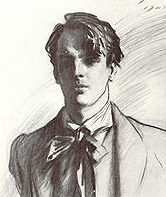
The Curse Of Cromwell
by William Butler Yeats
You ask what -- I have found, and far and wide I go: Nothing but Cromwell's house and Cromwell's mur- derous crew, The lovers and the dancers are beaten into the clay, And the tall men and the swordsmen and the horsemen, where are they? And there is an old beggar wandering in his pride -- - His fathers served their fathers before Christ was crucified. i(O what of that, O what of that,) i(What is there left to say?) All neighbourly content and easy talk are gone, But there's no good complaining, for money's rant is on. He that's mounting up must on his neighbour mount, And we and all the Muses are things of no account. They have schooling of their own, but I pass their schooling by, What can they know that we know that know the time to die? i(O what of that, O what of that,) i(What is there left to say?) But there's another knowledge that my heart destroys, As the fox in the old fable destroyed the Spartan boy's Because it proves that things both can and cannot be; That the swordsmen and the ladies can still keep com- pany, Can pay the poet for a verse and hear the fiddle sound, That I am still their setvant though all are under- ground. i(O what of that, O what of that,) i(What is there left to say?) I came on a great house in the middle of the night, Its open lighted doorway and its windows all alight, And all my friends were there and made me welcome too; But I woke in an old ruin that the winds. howled through; And when I pay attention I must out and walk Among the dogs and horses that understand my talk. i(O what of that, O what of that,) i(What is there left to say?)
0
Create a library and add your favorite stories. Get started by clicking the "Add" button.
Add The Curse Of Cromwell to your own personal library.
Add The Curse Of Cromwell to your own personal library.
Return to the William Butler Yeats Home Page, or . . . Read the next poem; The Dawn









